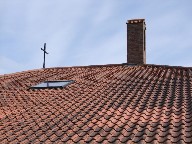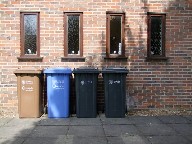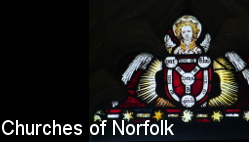| |
|
Church
Centre, Bowthorpe, Norwich
 |
|
Bowthorpe
is a large, modern planned suburb to the west of
Norwich, the nearest thing the Norwich area has
to a new town. It was built on an entirely green
field site within the city boundary. The parish
of Bowthorpe had emptied in the years after the
Reformation, leaving only the Hall and the ruin
of the parish church. The plan was for three
connected villages, each with its own character
but built in sympathetic styles, linked together
by a central shopping area, with an adjacent
industrial area on the Dereham Road. The placing
of the industrial area not only meant that it was
on the nearest major route, it also kept the
Bowthorpe residential area separate from the
anonymous sprawl of the New Costessey estate
across the Dereham Road. Unfortunately, as this
is the main way into Bowthorpe, the dreary
industrial area is most people's first impression
of the place, which is a little unfair.
|
As is
usually the case, things did not quite turn out
completely as envisaged. The first village, Clover Hill,
was begun in 1975, and its courtyard style seems to have
been based on the traditional courts of the Elm Hill area
of central Norwich. Unfortunately, the density was much
too high; and, as someone pointed out when it was too
late, the trouble with the Elm Hill area is that by the
19th Century it was slums. There was a laudable attempt
to keep traffic out of Clover Hill, but this created
further problems by making car ownership inconvenient, a
lack of foresight perhaps considering that we are nearly
five miles from central Norwich here.
These
problems were addressed to an extent in the construction
of the two other villages, Chapel Break and Three Score.
As you might expect, the central shopping area evolved
into what is little different to any out of town shopping
centre, with a vast Sainsbury's superstore and a Roy's
superstore beside it. Most people do their shopping by
car. There are some good individual buildings, the best
of which are the schools. The only older structure is the
ruin of the medieval church of St Michael, which sits at
the top of Bowthorpe beside the modern Church Centre. The
total population of Bowthorpe is now about 15,000 people.
Estates
like Heartsease on Norwich's east side, which had been
built in the earlier post-war period, were usually
planned with three designated churches, Anglican,
Catholic and non-conformist. By the late 1970s the
fashions were changing, and modern estates were instead
assigned an Ecumenical Partnership church which could be
used by all traditions and none. These covenanted
partnerships vary in their success - in some parts of
East Anglia some traditions prefered not to be involved,
or left the partnership when things got difficult, but
generally Bowthorpe's ecumenical church has worked well.
It was built in 1978 on the inner side of Clover Hill,
and as well as being used by the main church traditions
it is also in regular secular community use.
| The
frontage is of glass, flooding the interior with
light, and a dramatically pitched roof leads the
eye up from the road. The back of the church is
quieter and more traditional, with a little bell
turret above the brick wall looking out over a
lawn. Beyond is a garden of remembrance, from
which you can enter the ruins of St Michael, the
original parish church of Bowthorpe. The
architect was Peter Codling. The church was
originally known as the Open Door Church Centre,
a laudable intention, perhaps. The name
transmuted in the 1990s into the neo-California
style Bowthorpe Worship Centre, but today the
signs tell you that this is the rather more
traditional Bowthorpe Church Centre.
|
|
 |
|
|
|
